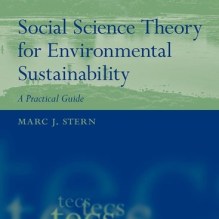What can social science teach us about sustainability?
By: Dr. Marc Stern
April 22, 2019

As we celebrate Earth Day today, sustainability challenges are top of mind for many people around the world. And with good reason—at its core, sustainability is a deeply human issue. That’s why knowing how to navigate the complexities of human behavior can be immensely useful in tackling environmental challenges.
Having researched socially driven environmental issues for twenty years, Virginia Tech professor Dr. Marc Stern has funneled his accumulated knowledge, along with the research of others, into a handy reference book for sustainability decision making. Social Science Theory for Environmental Sustainability: A Practical Guide introduces thirty theories, based on decades of research, followed by five fictional vignettes, rooted in real-world issues, to give readers a robust toolkit for problem-solving in the realm of human-environmental interaction.
Dr. Stern teaches in the Center for Leadership in Global Sustainability Masters programs, and his new book is a welcome addition to the curriculum. “My students call it the Cliff’s Notes to social science,” he explains. Dr. Stern’s inventive use of the vignettes in Social Science Theory for Environmental Sustainability paves a solid foundation for students to apply these strategies on their own. Throughout the course, he challenges them to teach each other all thirty theories and then utilize them in scenarios they have come across in the professional world.
The text addresses the stark truth that there is no one single answer to environmental problems, and offers a number of ways to combine principles in the problem-solving process. The guide’s introduction creates a comfortable atmosphere for the reader. In a conversational tone, Dr. Stern sets up researchers and casual readers alike for a journey through many facets of social aspects of environmental issues. “No matter what technical solutions we develop,” he says in the introduction to the book, “we must navigate the complexities of human behavior to activate their utility.” Without social science, he explains, we are often “left to our own intuitions and biases about why a particular effort should work or not.”
Social Science Theory for Environmental Sustainability reaches beyond the classroom. Dr. Stern has used it as a tool in webinars and workshops for numerous environmental organizations and even a political campaign. In these endeavors, he helped groups to translate lessons from social science into strategies for improving communications, reducing partisan conflict, and enhancing collaboration between stakeholders.
“At its heart,” he says, “this book is about collaboration. In the long run, it’s not about fighting over political differences. It’s about working together and drawing on our diverse knowledge to take care of our commons: the land, water, and air.”
---

Dr. Marc Stern is a professor at Virginia Tech’s Department of Forest Resources and Environmental Conservation. His research interests include human dimensions of natural resource policy and management, environmental communications, protected areas management, international conservation, natural resource management effectiveness, attitudes vs. actions, public responses to natural resource management, evaluation of environmental education and other outreach programs.


